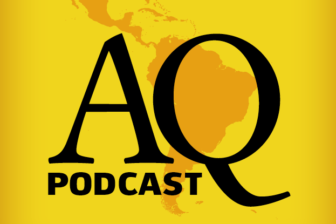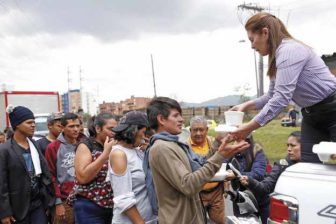This article has been updated
While much international attention was given to Colombia’s peace process with the Revolutionary Armed Forces of Colombia-People’s Army (FARC-EP), the country’s last remaining guerrilla group, the National Liberation Army (ELN), is still engaged in a war with the state that started in 1964. This conflict not only threatens the sustainability of the peace accord signed with the FARC, whose ongoing implementation faces numerous challenges, but is in fact at the heart of an unfolding regional crisis, entangled in tense geopolitics between the U.S., Venezuela, Cuba and Colombia.
Many observers mistakenly see the ELN as the FARC’s “little brother” – smaller in size, significance and military might. However, although the objectives of the ELN and the FARC’s armed struggle were similar, they had distinctly separate projects and ideologies. And since the FARC disarmed in 2017, the ELN has grown in strength and expanded into new territories, including power vacuums left by the FARC.
The COVID-19 pandemic seemed to create a window of opportunity for negotiations with the ELN, and the recent release of hostages in a humanitarian operation reanimated these hopes. However, these cannot be misinterpreted as steps towards the negotiating table. The ELN declared a month-long ceasefire in April, but since it ended the group has attacked oil pipelines, Colombia’s armed forces have undertaken bombing campaigns on guerilla camps, and the humanitarian situation of vulnerable rural populations in regions with ELN presence is worsening.
The Colombian-Venezuelan border is one of the key regions of territorial control. Today, the ELN is reportedly present in at least 13 of Venezuela’s 23 states, and has become a consolidated binational insurgency with strong ideological affinities with Chavismo. The group sees itself as leading an ongoing ideological clash against “U.S. imperialism.”
U.S. President Donald Trump has compounded this crisis. Since coming to power in 2017, U.S. foreign policy in Latin America has increasingly focused on Cold War-style anti-communist policies toward Cuba and Venezuela, including a “maximum pressure” strategy towards Nicolás Maduro’s regime, in which Colombia’s President Iván Duque has been an ally.
However, Maduro has so far withstood U.S. sanctions, a failed coup attempt led by Juan Guaidó, and U.S.-Colombian attempts to destabilize his regime. He retains control of the army, and has enough public support to fend off the opposition. The lack of diplomatic relations between Venezuela and Colombia has led to the border becoming a no-man’s land, with non-state armed actors proliferating, including the ELN but also neo-paramilitary and drug-trafficking groups. This is a fertile ground for Colombia’s conflict with the ELN to escalate into an international armed conflict. Given the increasingly bilateral nature of the ELN’s troops and ideology, the Colombian conflict and the Venezuelan issue must be resolved in tandem.
Meanwhile, peace has been completely side-lined from U.S.-Colombia relations, with Trump’s policy towards Colombia focusing on drug-trafficking. Trump has pressured Duque to return to spraying coca crops with glyphosate, despite the advice of the World Health Organization and widespread protests against aerial spraying from social movements and pro-peace organizations, who call instead for implementation of the peace accord signed with the FARC, which created measures for voluntary crop substitution rather than forced eradication. The news in June 2020 of the arrival of 800 U.S. troops to assist in counternarcotics strategies created fear of further militarization in coca-growing territories, many of which overlap with ELN hotspots.
An ELN negotiation delegation has been in Havana since 2018, when formal peace talks with the previous Colombian government of Juan Manuel Santos were taking place. Duque suspended the talks and, after an ELN attack in Bogotá killed 20 police cadets in January 2019, requested that Cuba, a guarantor of the incipient peace process, hand over the ELN negotiation team, requesting Interpol arrest warrants against them. Cuba did not comply, and in May 2020, the U.S. secretary of state added Cuba to the list of states that do not cooperate with U.S. counterterrorist efforts.
In March, Duque’s high commissioner for peace, Miguel Ceballos, re-designated two former ELN commanders, Francisco Galán and Felipe Torres, as “peace promoters,” a role given to members or ex-members of armed groups who have committed to peace negotiations. Unilateral gestures by the ELN and the government could indicate support for a negotiated solution to the conflict among at least some sectors on both sides. But the ELN and the Duque government both comprise hardline and moderate elements.
The prospects for negotiations between the Duque government and the ELN currently seem trapped by the anti-communist-cum-narco-terrorism rhetoric, which has a long-standing history based on the military alliance between the U.S. and Colombia. With Trump in power, the hardliners in Duque’s coalition are pulling him further towards the radicalized neo-conservativism shared by right-wing Cuban and Venezuelan diasporas and Brazil.
The 2020 U.S. elections will have a determining influence on the remainder of Duque’s mandate, and on the tone of the 2022 Colombian presidential elections. If Joe Biden is elected, the moderate elements of the Duque government could grow stronger. The U.S. could potentially return to an Obama-style doctrine towards Latin America, normalizing relations with Cuba and strengthening bipartisan support to peace building in Colombia. However, If Trump is re-elected, it is not impossible that he could take a more constructive direction in regional foreign policy, once he has secured his second term and no longer has to pander to his Florida bases. His recent U-turn on Guaidó is an example of his volatility regarding Latin America.
The chances for peace with the ELN depend on the regional politics of the next two years, particularly on presidential elections in the U.S. and Colombia. Irrespective of their outcomes, the forthcoming conjuncture looks gloomy if creative solutions to the unfolding regional crisis are not found. In the 1980s, the Contadora Group, launched by Colombia, Mexico, Panama and Venezuela, created a regional dialogue to tackle military conflicts in El Salvador, Nicaragua and Guatemala. One possible pathway for addressing the current geopolitical stalemate could take inspiration from this, and open a regional dialogue between Cuba, Colombia, Venezuela and the U.S., to close once and for all the recycling of political violence in Colombia, and its spillover into neighboring countries.
This article was updated to provide additional context surrounding the suspension of peace talks.
This article is based on previous work by the authors published by Embrace Dialogue. You can find the full version here.
—
Arteaga Garzón (@KarteagaG) is the director of Embrace Dialogue Colombia. Burnyeat (@GwenBurnyeat) is an anthropologist, writer and film-maker at University College London, and member of Embrace Dialogue. Gómez-Suárez (@AndGomezSuarez) is co-founder of Embrace Dialogue and Associate Researcher in Memory and Reconciliation in Colombia at the University of Bristol. Otálora Gallego (@GermanOtaloraG) works in Embrace Dialogue’s Transitional Justice and ELN teams.








